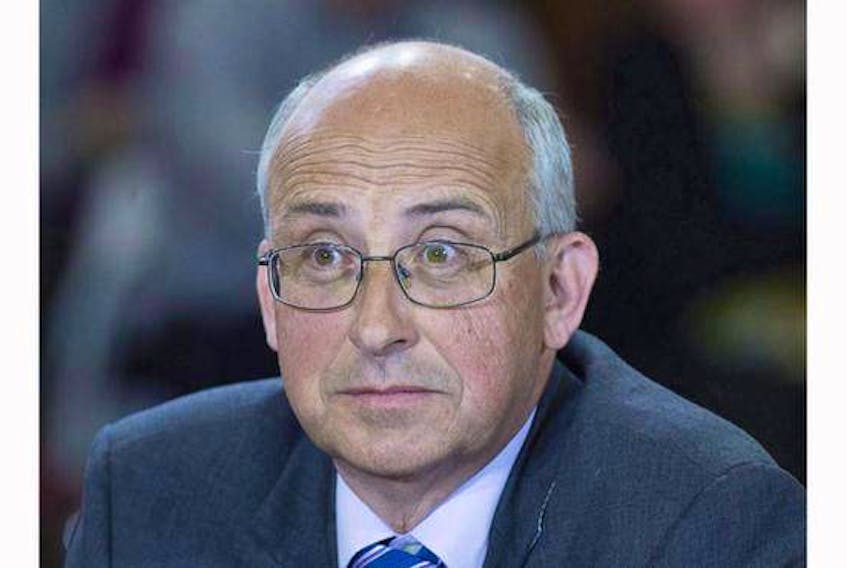The New Democratic Party is pressing the Nova Scotia government to follow a trend among larger provinces to boost the minimum wage to $15 an hour, a move the NDP leader says will help reduce youth outmigration.
“I would say that almost everyone from every political stripe or theoretical angle who studies our situation in Nova Scotia agrees that a key challenge for us is to be able to retain more of our young people, to stem this century-long outflow of our most capable young people … to other places and other parts of the country,” Gary Burrill told The Chronicle Herald.
“In order to do this, we have to become something other than a low-wage jurisdiction. At the moment, it’s not that we are floating somewhere around the middle of the pack somewhere, but on Oct. 1 of this year we became the province in Canada with the single lowest minimum wage.”
The minimum in Nova Scotia sits at $10.85 per hour for experienced workers and $10.35 for inexperienced ones.
On Wednesday, NDP labour critic Tammy Martin introduced a private member’s bill to amend the Labour Standards Code, setting the minimum at $11.70 an hour on Jan. 1, 2018, increasing it to $13.35 the following year and reaching $15 by 2020.
Ontario’s Liberal government is raising the minimum from $11.60 to $14 an hour on Jan. 1 and will make it $15 in 2019.
Alberta intends to make the minimum wage $15 per hour next year. In British Columbia, the government raised the minimum wage last month to $11.35 an hour and said it intends to reach $15 by 2021.
“We cannot prosper and thrive in Nova Scotia if we bury our heads in the sand,” Burrill said.
“We have to look across the country, see what the trends are … and try to make ourselves competitive within the overall picture.”
According to the Canadian Centre for Policy Alternatives, nearly 26,000 workers — about 6.6 per cent of the Nova Scotia workforce — earn minimum wage, and last year, more than 125,000 took home under $15 an hour. That’s about 32 per cent of all workers.
Citing statistics from Statistics Canada, the centre also said a large majority of those workers are not students and do not live with their parents. It said 71 per cent are in permanent positions and 58 per cent work for companies with 100 or more employees.
Simone Maillet, a 59-year-old cafeteria worker at the Universite Sainte-Anne in Church Point, said she has been in that job for nearly 41 years and now makes $14.07 an hour, while many of her colleagues make less.
While it doesn’t seem like a large jump to $15 an hour, it would make a difference because the cost of living always goes up, she said.
“Everything’s going up but our wages down here,” Maillet said.
“Fifteen dollars (an hour) would help because it’s tough to live lower than 15 right now. We’re barely surviving, and that’s it. Some of us have to get an extra job sometimes.”
Brandon MacBurnie, 23, grew up in Hammonds Plains and recently earned a bachelor of commerce degree in accounting at Saint Mary’s University. He worked a minimum-wage job at Tim Hortons for several years to help with his university debt.
After graduation, he filled out more than 100 applications and finally landed a job earlier this year as an accounting clerk at a car dealership at $13.25 an hour, MacBurnie said.
“Because the wage was so low, it was hard to make ends meet, and I had to look to the support of my family to help me get by,” he said.
In addition, the job was stressful and a colleague with a few years experience told MacBurnie the wages don’t get much better, so he and his fiancee moved to Toronto over the summer. He’s now working at a firm paying around $22 per hour.
“I can actually afford the basics now, but with ($13.25) I was not putting any payments towards my debt,” MacBurnie said. “I could barely afford the basic expenses.
“It just wasn’t enough.”
MacBurnie said Nova Scotia needs a $15-an-hour minimum wage to retain its young people.
“The majority of people I knew in university have not stayed,” he said. “I have one acquaintance from university that I know of that is currently staying in Nova Scotia.”
There aren’t a lot of job opportunities here and people are struggling to live on low wages, MacBurnie said.
“It’s something that Nova Scotia really, really struggles with,” he said. “The province, I think, is really in crisis.”
Labour Minister Labi Kousoulis told Global News last week the Nova Scotia Liberals are not looking at a $15-an-hour minimum but instead are considering a two-tier system with different wage minimums for companies with 26 or more employees and those with fewer than 26.
A Labour Department spokesperson said the Liberal government is also taking steps to improve the economy for low-income earners.
“It’s important to balance the needs of earners with the concerns of business, and we want to make sure we have an approach that works for Nova Scotia,” Lisa Jarrett said in an email.
“That means considering various aspects of minimum wage and looking at approaches used by other jurisdictions. This includes looking at options for harmonization in Atlantic Canada.
“We’re also doing things to help make life more affordable for Nova Scotians who need it most. We are reducing taxes (by raising the basic personal amount by up to $3,000), providing more support for affordable housing projects, introducing a free pre-Primary program for four-year-olds, expanding school breakfast programs (and) increasing support for training and workforce programs to help young people start their careers.”
The Progressive Conservatives declined to comment.
Burrill said raising the minimum wage to $15 an hour would give workers more disposable income and boost business by creating more demand. Increasing it gradually is realistic and will allow businesses to adapt, he said.
“We understand the pressures that improving our overall economy in this way will be for a number of businesses,” Burrill said. “We don’t wish for businesses to have to deal with these pressures in the form of an avalanche.
“This is an adjustment our economy has to make … so we think bringing it in over a three-year period is the best way to do it.”
The NDP says it will get its minimum wage bill to second reading at its next opportunity, but whether that comes in this fall session or next year is up to government.









